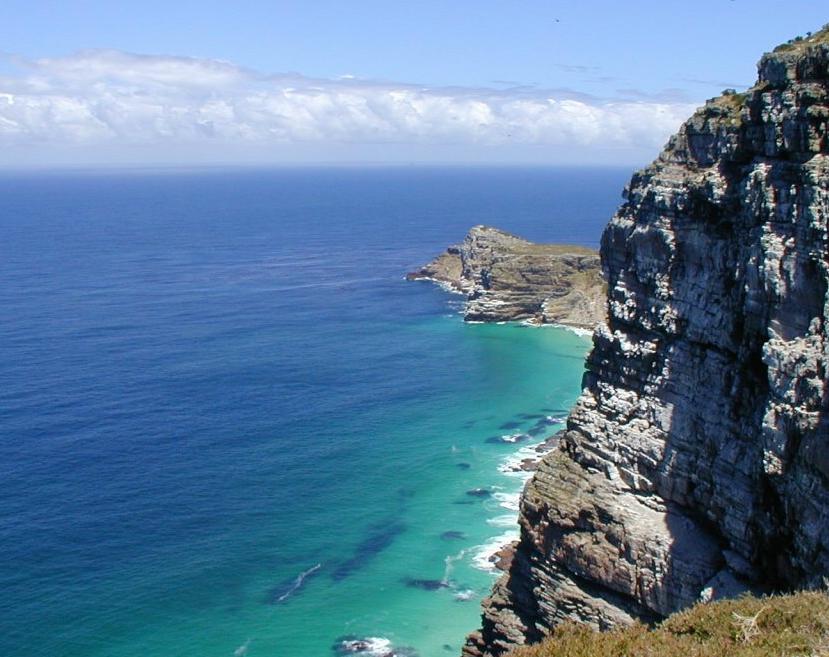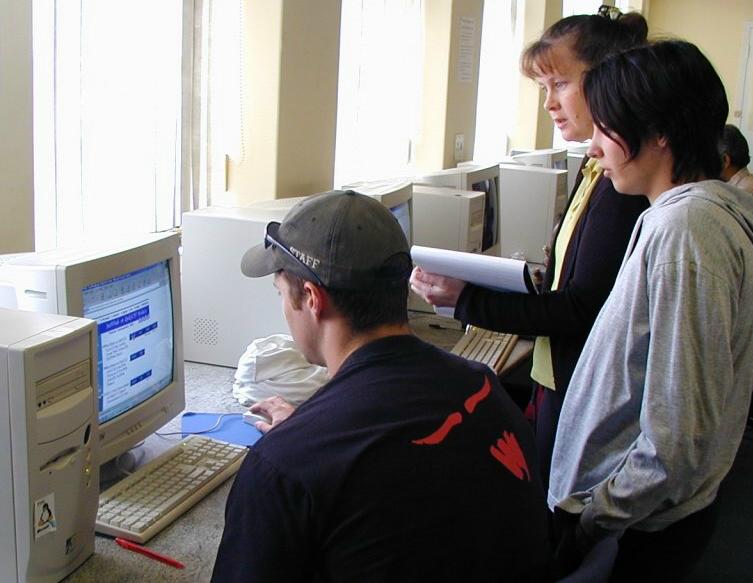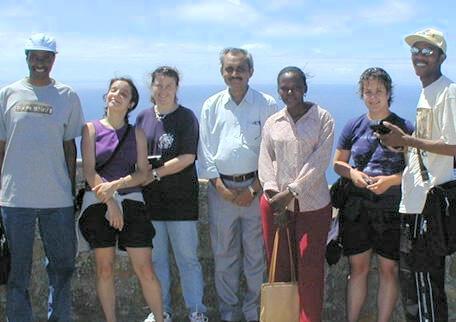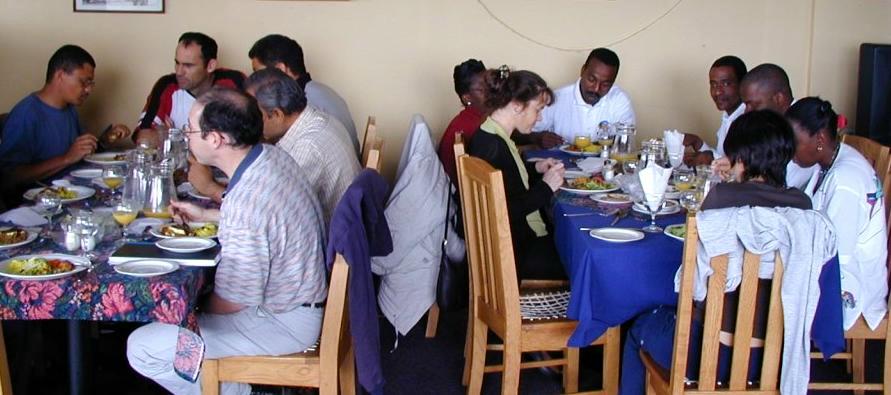Report of the IOCCG co-ordinated course on Remote Sensing of Ocean Colour: Analysis and applications
December 3 - 13, 2001Cape Town, S. Africa
Convenor: Professor Frank Shillington, Department of Oceanography, University of Cape Town, Rondebosch, S. Africa
 A ten day training
course on "satellite remote sensing of ocean colour: analysis and
applications", was held at the University of Cape Town, South Africa, from
3-13th December 2001. There were sixteen young scientists participating
from seven different African countries, and one each from India and
Argentina [view list of participants]. The course was held in the GIS lab shared jointly by the
Department of Oceanography and the Department of Environmental and
Geographical Science on the University's upper campus. Participants were
accommodated in the University of Cape Town's All Africa House, and meals
were provided by the University Staff Club.
A ten day training
course on "satellite remote sensing of ocean colour: analysis and
applications", was held at the University of Cape Town, South Africa, from
3-13th December 2001. There were sixteen young scientists participating
from seven different African countries, and one each from India and
Argentina [view list of participants]. The course was held in the GIS lab shared jointly by the
Department of Oceanography and the Department of Environmental and
Geographical Science on the University's upper campus. Participants were
accommodated in the University of Cape Town's All Africa House, and meals
were provided by the University Staff Club.
The course used the very dynamic Benguela Upwelling System off southwestern Africa as an example where there is good satellite data, for the "hands on" demonstration of fundamental SeaWiFS image analysis. Students had access to daily,, weekly and monthly composite ocean colour and SST data, and were introduced to the problems associated with cloud cover, and digital representation of the images. Typical image analysis techniques such as calculating the histogram of pixel values, colour bar enhancement, filtering etc. were used by the students to display the images.
 The software used was the UNESCO supported Bilko package. Each student had
access to a Pentium III PC attached to the network and internet facilities.
A copy of SeaDAS on a SGI ORIGIN 2000 mini supercomputer was available.
Students reported that the local internet connection was far superior to
what they had "at home". In fact, some students downloaded 300 Mb of data
to take back with them. Unfortunately the individual CD ROM's with the
Bilko software that were to be distributed to the students, did not arrive
before the course ended, but these will be posted to the students
shortly.
The software used was the UNESCO supported Bilko package. Each student had
access to a Pentium III PC attached to the network and internet facilities.
A copy of SeaDAS on a SGI ORIGIN 2000 mini supercomputer was available.
Students reported that the local internet connection was far superior to
what they had "at home". In fact, some students downloaded 300 Mb of data
to take back with them. Unfortunately the individual CD ROM's with the
Bilko software that were to be distributed to the students, did not arrive
before the course ended, but these will be posted to the students
shortly.
 The mornings were devoted to lectures on a variety of topics
by active researchers in the South African region. These included a brief
report on the IOCCG functions, a review of the Benguela Upwelling System
Dynamics, and elementary background to satellite remote sensing, by the
convenor (Dr Frank Shillington); detection of hydrogen sulphide in the
Benguela System from SeaWiFS, by Scarla Weeks (Ocean Space and UCT);
introduction and hands on demonstration of SeaDAS for ocean colour
processing by Herve Demarq (IRD and IDYLE research Associate); in situ
pigments by Dr Ray Barlow (M &; CM); apparent and inherent optical
properties, and an introduction to primary productivity, by Ph.D student
Stewart Bernard; an introduction to the OCM instrument on the Indian
satellite IRS-P4 by Himmat Solanki (Indian Space Applications Centre);
indices and record anchovy recruitment by Dr Claude Roy (IRD and IDYLE
research Associate); neural network techniques analysing satellite and
chlorophyll data by Dr Anthony Richardson (ENVIFISH researcher). [view schedule]
The mornings were devoted to lectures on a variety of topics
by active researchers in the South African region. These included a brief
report on the IOCCG functions, a review of the Benguela Upwelling System
Dynamics, and elementary background to satellite remote sensing, by the
convenor (Dr Frank Shillington); detection of hydrogen sulphide in the
Benguela System from SeaWiFS, by Scarla Weeks (Ocean Space and UCT);
introduction and hands on demonstration of SeaDAS for ocean colour
processing by Herve Demarq (IRD and IDYLE research Associate); in situ
pigments by Dr Ray Barlow (M &; CM); apparent and inherent optical
properties, and an introduction to primary productivity, by Ph.D student
Stewart Bernard; an introduction to the OCM instrument on the Indian
satellite IRS-P4 by Himmat Solanki (Indian Space Applications Centre);
indices and record anchovy recruitment by Dr Claude Roy (IRD and IDYLE
research Associate); neural network techniques analysing satellite and
chlorophyll data by Dr Anthony Richardson (ENVIFISH researcher). [view schedule]
 I would like to thank all the guest lecturers that
helped to make the course a success: Dr Claude Roy, IRD and UCT; Dr Anthony
Richardson, UCT, Dr Ray Barlow, Marine and Coastal Management, Cape Town;
Ms Scarla Weeks, Oceanspace and UCT; Mr Herve Demarcq, IRD and M &; CM, Mr
Stewart Bernard, UCT. Thanks is also due to the Centre for Marine Studies
manager, Mr Emlyn Balarin for handling the logistical and financial
support. The IOCCG Project Scientist, Dr Venetia Stuart, provided
invaluable advice. Mr Jeremy Main provided computer assistance (especially
when the power failed!). Naturally the students played the major role by
sharing ideas and contributing their own particular expertise in the form
of discussion of their projects. I really enjoyed the experience, and trust
that the students gained a great deal of knowledge from the course.
I would like to thank all the guest lecturers that
helped to make the course a success: Dr Claude Roy, IRD and UCT; Dr Anthony
Richardson, UCT, Dr Ray Barlow, Marine and Coastal Management, Cape Town;
Ms Scarla Weeks, Oceanspace and UCT; Mr Herve Demarcq, IRD and M &; CM, Mr
Stewart Bernard, UCT. Thanks is also due to the Centre for Marine Studies
manager, Mr Emlyn Balarin for handling the logistical and financial
support. The IOCCG Project Scientist, Dr Venetia Stuart, provided
invaluable advice. Mr Jeremy Main provided computer assistance (especially
when the power failed!). Naturally the students played the major role by
sharing ideas and contributing their own particular expertise in the form
of discussion of their projects. I really enjoyed the experience, and trust
that the students gained a great deal of knowledge from the course.